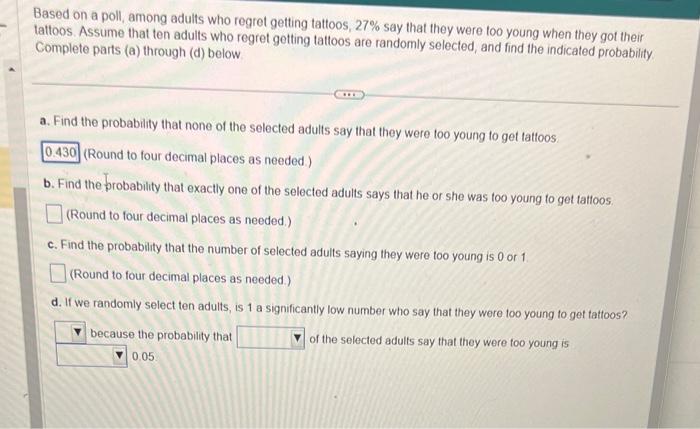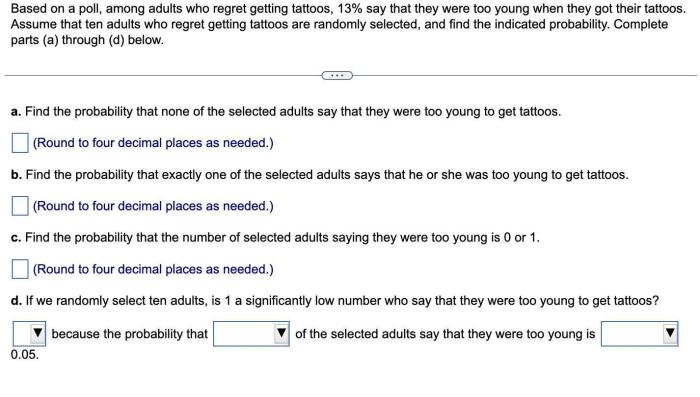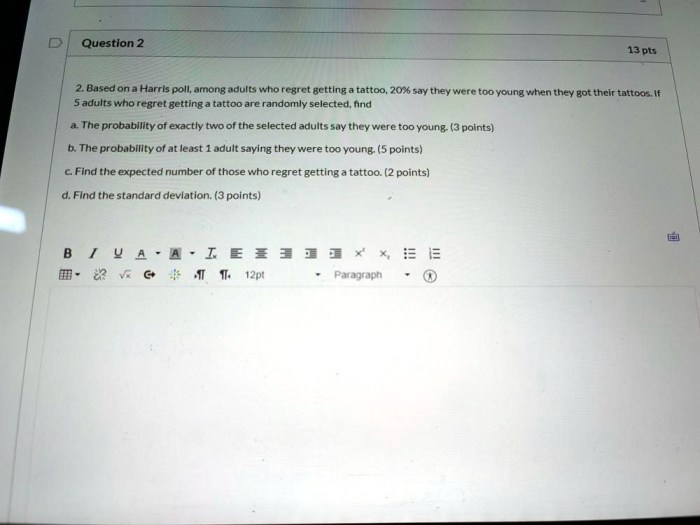Based on a poll among adults who regret getting tattoos, this article delves into the multifaceted phenomenon of tattoo regret, shedding light on its motivations, emotional and social consequences, and available coping strategies.
From impulsive decisions to societal pressures, the reasons behind tattoo regret are complex and varied, impacting individuals’ self-esteem, body image, and social interactions.
Motivations for Tattoo Regret
Tattoo regret is a common phenomenon, with studies indicating that up to 20% of individuals regret getting at least one tattoo.
The motivations for tattoo regret are varied, but some of the most common factors include:
- Age:Tattoos acquired at a young age are more likely to be regretted later in life as tastes and preferences change.
- Social pressure:Tattoos obtained under social pressure or to conform to group norms can lead to regret if they do not align with one’s true values.
- Poor decision-making:Impulsive or poorly thought-out tattoo decisions can result in regret, particularly if the tattoo is poorly executed or offensive.
Emotional Impact of Tattoo Regret

Tattoo regret can have a significant emotional impact on individuals, leading to feelings of:
- Shame:Individuals may feel embarrassed or ashamed of their tattoos, especially if they are visible or offensive.
- Embarrassment:Tattoos can become a source of embarrassment in social situations or when interacting with others.
- Anxiety:The presence of unwanted tattoos can trigger anxiety or self-consciousness, particularly in situations where they are visible.
Tattoo regret can also negatively impact self-esteem and body image, as individuals may perceive their tattooed bodies as flawed or undesirable.
Social Consequences of Tattoo Regret

Visible tattoos can have social consequences, leading to:
- Discrimination:Individuals with tattoos may face discrimination in employment, housing, and other social situations.
- Negative judgment:Tattoos can elicit negative judgments or stereotypes from others, which can impact social interactions and relationships.
- Impact on relationships:Tattoos can become a source of conflict or disapproval within relationships, particularly if they are not shared values or preferences.
Tattoo Removal Options
There are several methods available for tattoo removal, including:
- Laser tattoo removal:This is the most common method, using laser energy to break down tattoo ink into smaller particles that are then absorbed by the body.
- Surgical removal:This involves surgically excising the tattooed skin, but it can leave scars and is generally not recommended.
- Dermabrasion:This technique uses a rotating brush to remove the top layers of skin containing the tattoo ink.
- Chemical peels:This method involves applying a chemical solution to the tattoo to remove the top layers of skin.
The effectiveness, cost, and potential risks of each method vary, and the best option depends on the individual tattoo and the patient’s preferences.
Decision-Making for Tattoo Removal

The decision to remove a tattoo is a significant one, and several factors should be considered:
- Cost:Tattoo removal can be expensive, depending on the size, color, and age of the tattoo.
- Time commitment:Laser tattoo removal typically requires multiple sessions over several months or years.
- Potential risks:Tattoo removal can cause scarring, changes in skin texture, or allergic reactions.
Individuals considering tattoo removal should carefully weigh these factors and consult with a qualified professional to make an informed decision.
Coping with Tattoo Regret

Coping with tattoo regret involves:
- Acceptance:Acknowledging and accepting that the tattoo is a part of one’s past and cannot be changed.
- Self-compassion:Treating oneself with kindness and understanding, recognizing that mistakes happen.
- Managing emotional and social challenges:Seeking support from friends, family, or a therapist to deal with negative emotions and social stigma.
Coping with tattoo regret is a journey that requires time, effort, and self-acceptance.
Clarifying Questions: Based On A Poll Among Adults Who Regret Getting Tattoos
What are the most common reasons for tattoo regret?
Poor decision-making, social pressure, age-related factors, and changes in personal style or beliefs are among the most prevalent reasons for tattoo regret.
How does tattoo regret affect individuals emotionally?
Tattoo regret can evoke feelings of shame, embarrassment, anxiety, and dissatisfaction, potentially impacting self-esteem and body image.
What are the potential social consequences of tattoo regret?
Visible tattoos may lead to discrimination, negative judgment, and limitations in employment and social opportunities.
What are the available options for tattoo removal?
Laser therapy, surgical excision, and dermabrasion are the primary methods for tattoo removal, each with varying effectiveness, costs, and potential risks.